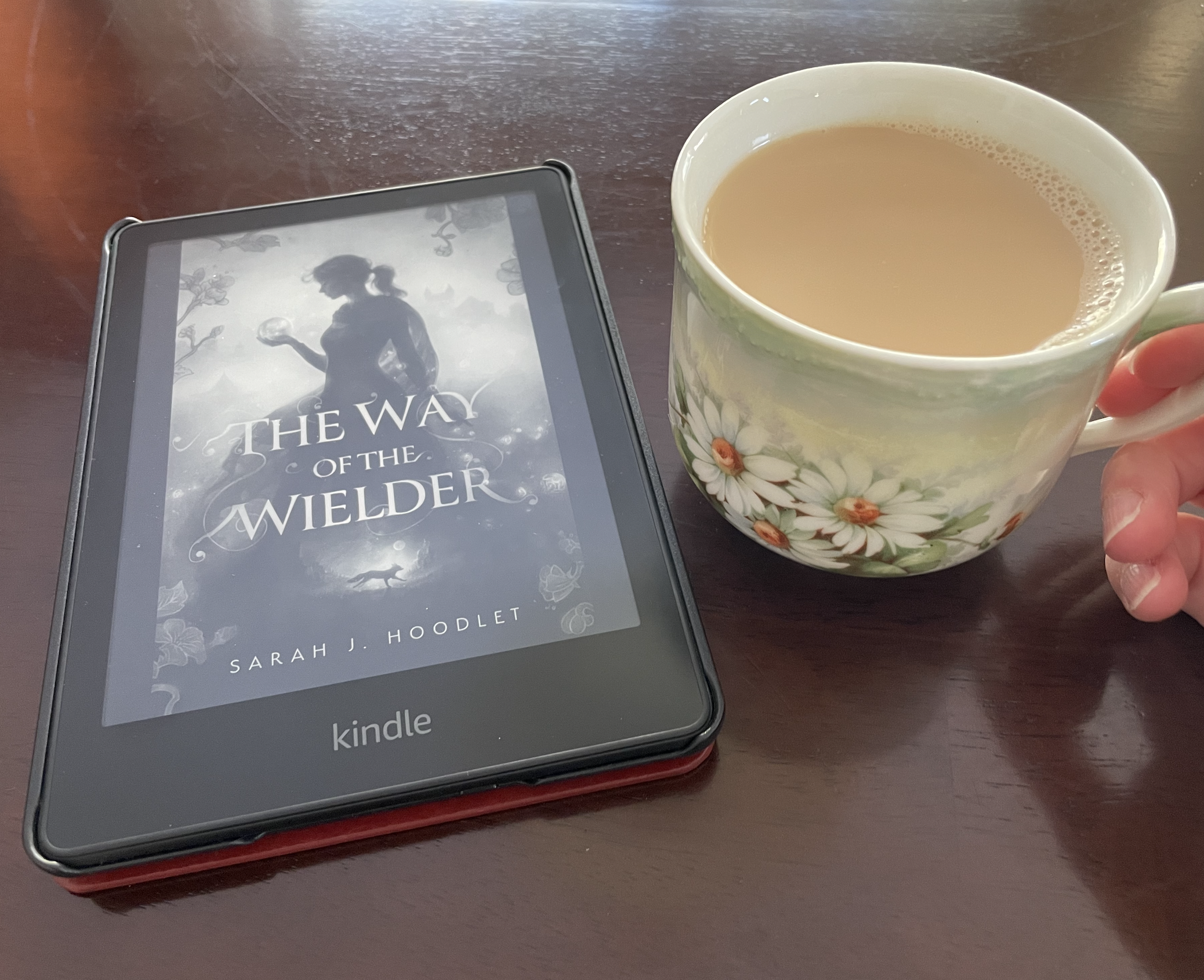Amazon Exclusivity

19 February 2025
Categories:
Above: An open Kindle, showing the cover of The Way of the Wielder, next to a green floral teacup filled with chai.
February 19, 2025
It’s hard to see it, but we’re inching closer to spring. The air is still cold and dry here, but the days are getting a little longer, the sun is burning a little stronger, and March is around the corner. Soon, the scent of petrichor will replace the crispness of winter, and all will be well.
Until then, let’s get into some updates.
Updates
Convergence of Connection: I’ll receive feedback from editor by the end of the month. I’m waiting patiently, but I’m excited to get her thoughts!
The Way of the Wielder, Book Four: I’ve hit 19,500 words written, or just over 10% of the anticipated first draft. I’m loving where things are headed! I don’t want to give too much away, but it has everything—magic, mystery, romance, adventure, action, and a bit of well-deserved justice. I can’t wait to share it with you all!
The Heartbeat and the Submarine: I’ll spend this week editing this book. Once done, my friend’s son (who’s 10) will read it, to make sure it reads well for the age group. Then it’s onto finding an editor and cover artist!
Amazon: The Big, the Bad, and the Benefits
That sounds like a band name.
Anyway, today I want to talk about something that’s been on my mind for a while: selling books exclusively on Amazon. I recently wrote a long thread about this on Mastodon, which garnered lots of feedback from other indie authors. It was a good discussion, and left me with even more thoughts.
I know many people are averse to Amazon. I understand that. Generally, I am too. I love shopping local and supporting small businesses—especially bookstores. However, there has been a lot of talk about boycotting Amazon entirely, even (perhaps especially) for books. The problem with this is that many indie authors are on Amazon, and many are there exclusively.
The Argument for Exclusivity
For those who aren’t aware, when selling an ebook on Amazon, authors have two options: going wide or being exclusive. “Going wide” means your book can be sold on other platforms (Kobo, Barnes & Noble, Smashwords, etc.). “Being exclusive” means your book is only available on Amazon.
There are a few reasons why authors choose to be exclusive to Amazon. It’s easy to keep track of things when everything is in one place, millions of people still use Amazon on a daily basis, and being exclusive allows for a book to be in Kindle Unlimited.
Kindle Unlimited (or KU) is a paid subscription service, which gives readers access to ebooks available exclusively within the Amazon environment. There are millions of titles available on KU, and it’s estimated that there are four million readers who use it. That’s a lot of potential readers.
My Reason for Being Exclusive
It’s suggested that romance is one of the most popularly read genres in KU. That, coupled with the rise of “romantasy” (which I’ve talked about before), has perpetuated the relative success of The Way of the Wielder series.
I’ll get into more detail next month, but The Way of the Wielder alone has had over 104,000 pages read since May. That’s equivalent to 127 books. Since publishing last March, I’ve sold 212 books (combined ebook and print). Doing the math, that’s about 36% of my readership being in KU. That’s…not insignificant.
As an author, all I really want is my books to be read (I’d also love for them to be loved, but that’s another topic). KU offers a great way to reach millions of potential readers. Could I reach more if I went wide? Of course. And I’ve even considered selling my books directly, cutting out the middle-man altogether.
However, I recently read a study where the data showed that authors tend to do better on the direct sales path when they have more books available. This isn’t just because they have more books; it’s because they have been able to build a deeper connection with their readers over time, making a direct sales option appealing to their fanbase.
This is certainly something to aspire to. Once The Way of the Wielder series is complete, I’ll have four adult romantic fantasy books published, with another series (consisting of eight books, the first of which is already written) on the way. Perhaps then I’ll initiate a direct sales store. In the meantime, I’ll stay exclusive to Amazon, building a fanbase of devoted readers while I grow into a more seasoned writer.
(It’s important to note that exclusivity to Amazon is ebook only. I could sell print books wide, but I haven’t researched this yet. It might not be worth it, given that 70% of my sales are ebooks, but I’ll look into it as a non-Amazon option.)
Now for the Bad
You may have heard that Amazon recently announced they were removing the “download and transfer” feature from Kindle eReaders. What this means is that any ebooks you’ve purchased in the Amazon environment won’t be available to be downloaded and read on another, non-Amazon eReader or PC (unless you have the Kindle app).
If you only ever read ebooks on a Kindle, this change probably won’t impact you. However, if you buy ebooks on Amazon and download them to read on another eReader, you won’t be able to do so after February 26. (You can download your library prior to this date, if you need to.)
This is not a welcomed change for folks. In fact, much of the rhetoric I’ve seen on social media has turned from general aversion (to Amazon) to straight anger. That anger feels like an attack on authors who are—and who choose to remain—exclusive to Amazon, and I don’t think that’s fair.
Bad is a Matter of Perspective
My husband and I were discussing the Amazon change over the weekend, and he brought to my attention something I didn’t know. Last month, Meta admitted to torrenting tens of millions of pirated books to train their AI models. Evidence shows that at least 81.7 terabytes of data were torrented recently, and 80.6 terabytes previously.
To put that into perspective, The Way of the Wielder is approximately a 1.5 megabyte file. 81.7 terabytes of data is just shy of 54.5 million copies of my debut book.
There’s nothing conclusory about Amazon’s decision to remove the “download and transfer” feature. However, my husband theorizes that it’s possible Amazon made the move to protect authors’ work from being stolen. If that’s true, then is it really such a bad thing?
It’s important to note that my husband is a known and respected professional in the InfoSec community. He’s given numerous talks around the globe, hosted the Application Security Weekly podcast, and now works for a world-renowned security research and consulting firm. He’s knowledgeable about technology in ways I can’t even begin to understand, but I trust him to not lead me astray when it comes to protecting my work.
At the End of the Day…
It’s important to remember that self-publishing is hard. Self-published authors are writers, readers, editors, sometimes cover artists, formatters, sometimes narrators, marketers, and promoters. More importantly, we’re human beings. We have to champion our own books, day in and day out, without getting discouraged by negative reviews, genre haters, book bans, and more. And many of us do that after having tried our hand at getting traditionally published, which has its own set of challenges and (often) rejection. For context, The Way of the Wielder was rejected 40 times by literary agents before I decided to go the self-publishing route.
If you don’t support Amazon, that’s fine. I absolutely will not begrudge anyone for their choices or ethics on the matter. And I hope that’s reciprocated.
——
That was a lot. Thanks for sticking around until the end.
Until next time, be well, and stay creative!
~Sarah
